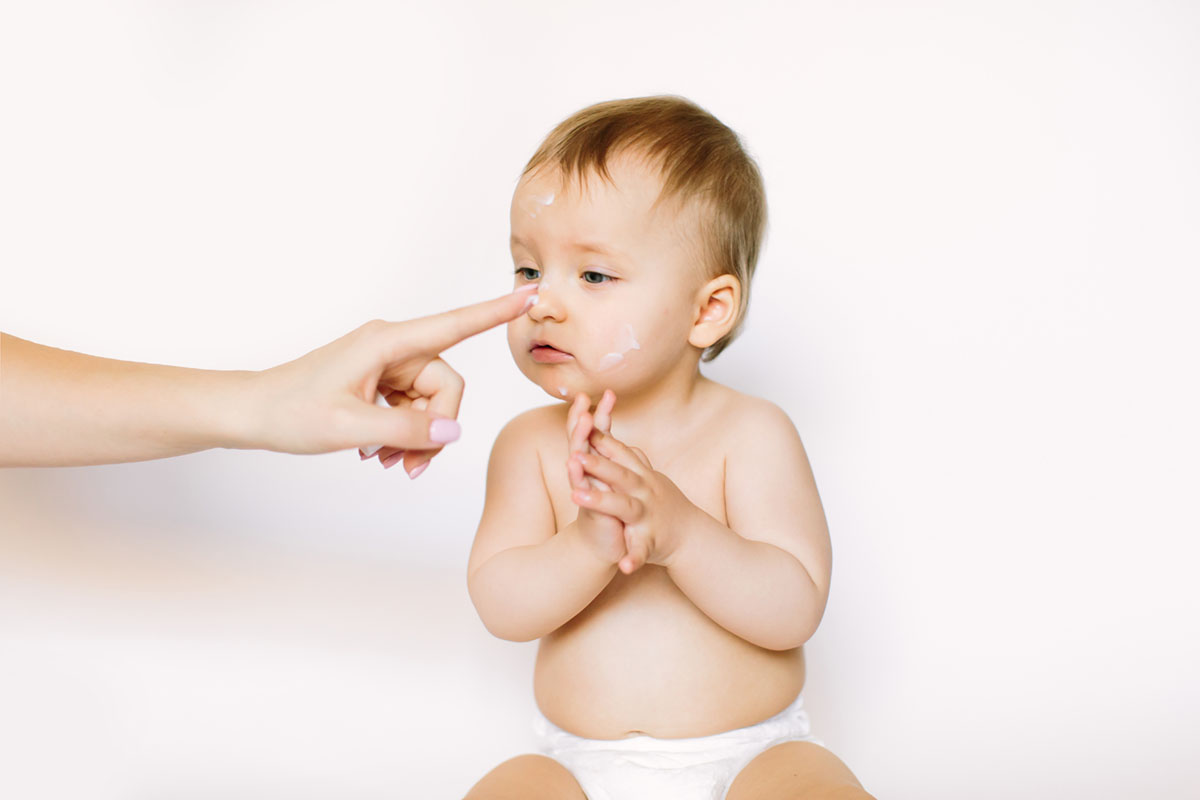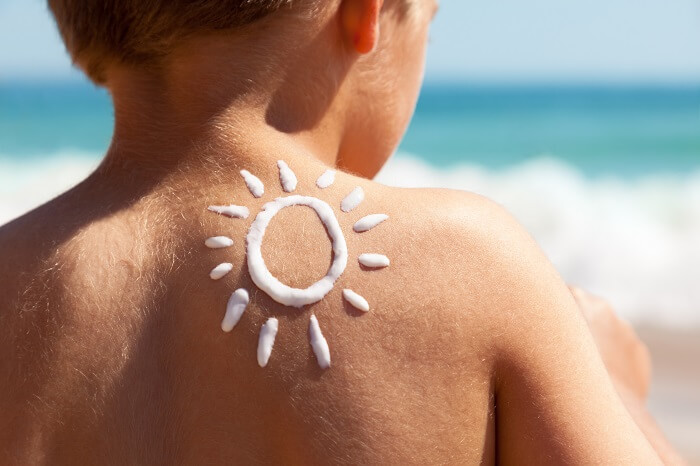Moisturising Your Baby
What matters in baby skin care
An infant's skin is significantly more sensitive than that of an adult. It's much thinner, and the natural protective barrier is still developing. Many parents wonder: Should I moisturise my baby or not?
The general rule is: Regular use of baby cream can certainly help protect the little body from environmental factors and the skin from drying out or nappy rash. However, less is more!
Care should always be tailored to the skin's condition and the specific body part. Dry skin prone to eczema typically requires more frequent care than normal skin. The skin in the nappy area, on the other hand, needs different care than the skin on the body and face.
For sensitive baby skin
Linola Baby & Kind
Beginning and frequency of baby skin care
When and how often should you moisturise your baby?
There's no set time for when you should start moisturising your baby. It's important to observe the needs of their skin. If it appears notably dry, you can comfortably use baby cream once or twice a day to moisturise your newborn.

"I recommend moisturising the baby's skin only when necessary – that is, when the skin is dry. So, keep an eye on how your little one's skin looks and feels. When choosing creams and lotions, look for well-tolerated ingredients and ideally avoid perfumes and fragrances."
Edith Janzen, Midwife at the Birthing Centre Bielefeld, Germany
If your baby's bottom becomes sore quickly or suffers from the common nappy rash, you should regularly apply a specific barrier cream– ideally after every nappy change or as needed. If there are no skin issues, it's sufficient to moisturise your child after bathing if necessary.
Moisturising your baby in winter
Winter presents a unique challenge: During this season, baby's skin requires extra attention as it can quickly be affected by the cold and dry air. A rich baby lotion can provide an additional dose of moisture to dry skin in winter.
Clothing and fabric offer the most effective protection against the cold. But what about the skin on the face? It's not really possible to shield the face effectively from the damp-cold weather in winter using clothing. It's best to get a wind and weather cream, a special ointment for your baby. By moisturising the face with it, you prevent the delicate skin from drying out. Tip: It's better not to apply the cream too thickly, but to reapply as needed.
Moisturising face, body, and bottom
The best baby care for different body parts

Different circumstances require different measures. That's why there are numerous products for the skincare of your little cherub, such as nappy cream, face cream, or barrier ointment. Some mothers also swear by homemade breast milk cream.
Whichever product you choose – always ensure that it's tailored to the specific needs of sensitive baby skin. Moreover, it's advisable to opt for baby care without perfume. Perfumes often contain allergenic substances. If the skin comes into contact with such substances early and regularly, it can become sensitised, leading to allergies. And let's be honest: No perfume in the world can compete with the unique and irresistible scent of your little one!
Generally, the face and body don't require different products. A special face cream for babies is therefore unnecessary. If your child suffers from so-called baby acne, it's better to moisturise the affected areas less frequently, sparingly, and use lighter formulations – known as oil-in-water emulsions. The little spots of baby acne usually disappear on their own within a few weeks. If you're unsure, consult your midwife or paediatrician.
In addition to the face and body, the baby's bottom also appreciates proper care – not just when it's sore, but especially as a preventative measure. If your little one has sore spots on their bottom, you should use appropriate barrier ointments that are suitable for this area.
Tips for moisturising your baby
What to consider when moisturising newborns

Room temperature during moisturising:
When you want to moisturise your baby's delicate skin, first ensure a comfortable environment. The room temperature should not be colder than 22° Celsius, as your little treasure is sensitive to cold and prone to catching colds. A heat lamp above the changing table is especially pleasant in such situations. Make sure your hands are warm and spread some baby cream in them before gently applying it to your baby's skin.
Amount and dosage of baby cream:
When moisturising babies, it's not only important which lotion you use but also how much. A balanced amount of baby lotion ensures that the sensitive baby skin is optimally cared for. The general rule of thumb is "less is more".
A helpful method is dosing using the fingertip. This gives you a good measure of how much baby cream the different body areas need:
- Face and neck: A fingertip of cream is already sufficient here.
- Arms and hands: Here too, a fingertip of cream is entirely adequate.
- Legs and feet: Since these areas often experience more wear, such as from crawling, it's recommended to use 1.5 fingertips of lotion. This keeps the skin supple and well protected.
- Chest and stomach: These central body areas are often less dry, so a fingertip of cream is also sufficient here.
- Back and bottom: Due to the larger area, 1.5 fingertips of lotion should be used.

It's always advisable to gently massage the lotion in circular motions to promote circulation. Remember that less is often more, and adjust the amount as needed to suit your baby's individual needs.
Strengthening the parent-child bond:
You shouldn't view moisturising merely as a care measure. The gentle caresses have a positive effect on your child's physical and mental well-being. You might also feel that these moments filled with tender touches are beneficial for you. Moreover, they strengthen the bond between you and your newborn. So, don't hesitate to combine moisturising with a gentle baby massage and incorporate it as a soothing cuddling session into your shared week.
Linola Baby & Kind
For baby-soft skin
Content verified by

Content verified by: Edith Janzen
Edith Janzen has been a midwife at the Birthing Centre Bielefeld in Germany since 2012 and is a mother herself. Her areas of expertise include out-of-hospital obstetrics, prenatal care, and postnatal care. She supports numerous families from the beginning of pregnancy through childbirth to the end of the postpartum period, providing advice and assistance during this special phase of life.
Additional topics & information
All about child and baby care

Baby Care – Tips for Newborn Skin Care
Newborns have very thin skin, making it susceptible to disturbances and irritations. Learn how the right baby care can support the healthy development of the skin.

Sun Protection for Babies and Children – Tips for Parents
The skin of babies and children reacts particularly sensitively when exposed to the sun without protection. Sun protection involves more than just sunscreen. Here, parents can find tips on what matters when it comes to protecting babies and children from the sun.

Sensitive Skin in Children – What to do if the skin itches?
Children's skin is not only more delicate and softer than adults', but it's also more sensitive and dries out more easily. To prevent itching from occurring in the first place, it requires gentle skincare.




